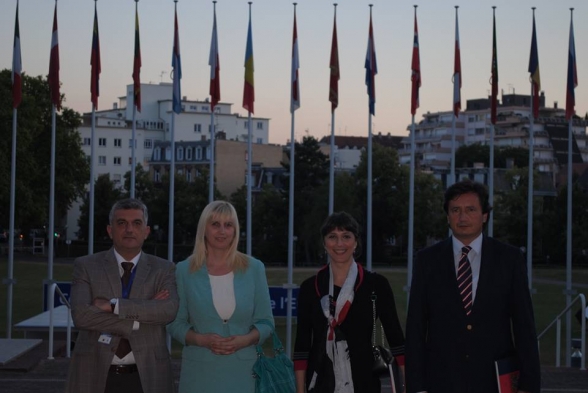Parliamentary Assembly of the Council of Europe offered to provide a forum for debating the future political form of the European Union and numerous the challenges that European democracy had been facing
During the discussion on parliamentary contribution to resolving the conflict in Western Sahara, the need to continue negotiations under the auspices of the United Nations was stressed, with a view to achieve a just, lasting and mutually acceptable political solution for all the parties included. Parliamentarians encouraged member States of the Council of Europe to intensify their efforts and work together in finding a final political solution to the conflict, in order to achieve lasting security and stability in the Western Sahara area. Despite the progress made by Morocco with regard to human rights and the rule of law, the Assembly expressed concerns about a number of alleged human rights breaches in Western Sahara.
During the afternoon, the joint discussion was led about identities and diversities of intercultural societies and integration of migrants in Europe. The Assembly expressed its concern about the situation of legal immigrants and their offspring, because their integration remains unsatisfactory still. In order to promote integration more effectively, the Assembly emphasised the need to return to comprehensive policies which ensure a better redistribution of wealth, and advocated a series of measures relating to the labour market, education, political participation, to improve the situation of migrants. It was concluded that the integration of migrants required a proactive, long-term and global action.
The ceremony to commemorate the First World War was held during the day. On that occasion, PACE President, Ms Anne Brasseur, stressed that creating an international order without dialogue is impossible. She reminded that in a spirit of dialogue, co-operation and openness the Council of Europe had been founded, in order to foundations for sustainable peace and respect of human rights of citizens. She pointed out that the role of the Council of Europe was more important today than ever before, because number of activities must be undertaken in order to guarantee European citizens the exercise of human rights, particularly the right to peace and a life without fear.
Members of the delegation of the Parliament of Montenegro to the Parliamentary Assembly of the Council of Europe participated in the meetings of its working bodies: Committee on Political Affairs and Democracy, the Committee on Culture, Science, Education and Media, Committee on Migration, Refugees and Displaced Persons, the Committee on Legal Affairs and Human Rights, the Sub-Committee for Persons with Disabilities and inclusion and the Subcommittee on Gender Equality. They also participated in the meeting of the Socialist Group. They attended a number of social activities organized during the Summer Session of the Parliamentary Assembly of the Council of Europe.
Within the campaign of the Council of Europe ″One in five″, the part of which Montenegro was, the 19th meeting of the Network of parliamentarians for the fight against sexual violence against children was held today. The topic of the meeting was: ″Participation of young people-agents for the prevention of sexual exploitation″.
The Session will be continued tomorrow with the debate on political and humanitarian consequences of the crisis in Ukraine, followed by a speech of the newly elected President of Ukraine, Mr Petro Poroshenko.
In the afternoon, there will be discussions about the challenges faced by the Development Bank of the Council of Europe and about the European administration and the challenges faced by the state administration.
The Montenegrin delegation on the Summer Session is composed of: Mr Predrag Sekulić, Mr Damir Šehović, Mr Mladen Bojanić and Ms Snežana Jonica.









